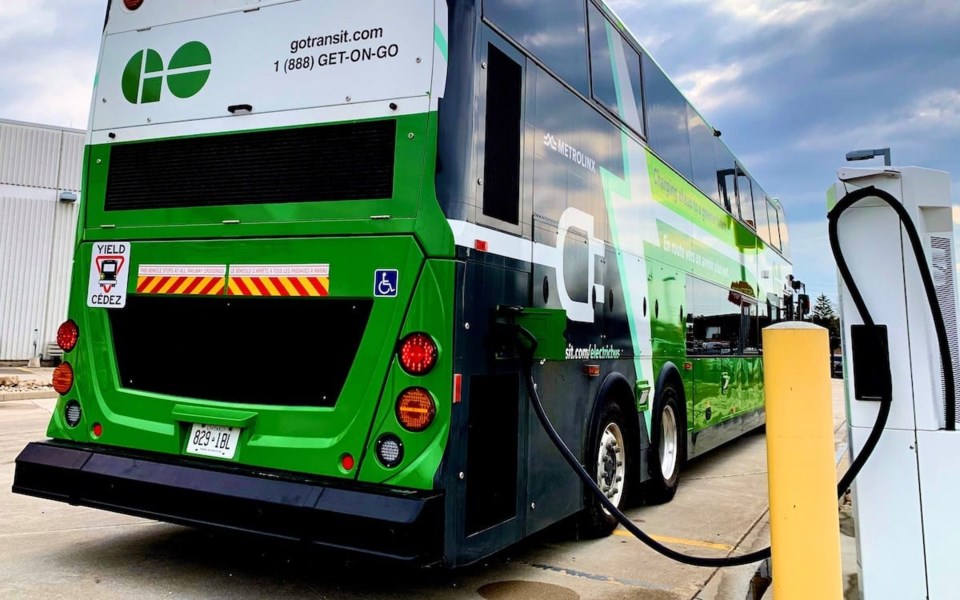It appears as though this year’s purchase of six diesel buses will be the city’s last.
They’re expected to go the all-electric route.
In a report by city Transit Services acting director Laura Gilbert, the city proposes to replace its entire 59-vehicle fleet with battery-electric buses by 2035.
Diesel buses carry an estimated lifespan of 12 years.
GOVA Transit doesn’t currently have any electric buses.
The city’s GOVA Transit electrification plan is in keeping with the Community Energy and Emissions Plan city council adopted in 2019 after declaring a climate emergency, which sets the goal for a 100-per-cent electric fleet by 2035.
Although battery-electric vehicles cost less in fuel than diesel buses, these cost savings do not appear to offset the additional upfront costs associated with battery-electric vehicles.
This includes battery-electric vehicles costing approximately $1.87 million apiece against diesel buses’ $780,000, according to Gilbert’s report.
Plus, there’s the cost of additional infrastructure required to charge the buses, totalling approximately $16.8 million.
Using 2023 costs, the city estimates the 2023-50 upfront cost of buying battery-electric buses, including infrastructure, would be $156.2 million, which is $98.2 million greater than the cost of their diesel counterparts.
Factoring in lifecycle capital costs (battery-electric vehicles are projected to cost slightly more) and higher operating costs (extra travel hours to swap out buses to recharge), the net additional cost of battery-electric vehicles over conventional diesel buses between 2023-50 is $89.1 million (a figure which includes $19 million in fuel savings, since electricity costs less than diesel).
City council members are slated to discuss Gilbert’s report during their March 17 community and emergency services committee meeting, at which they’ll vote on whether to proceed with the plan.
Their March 17 decision won’t represent their final say. In addition to a requirement that city council as a whole ratifies their decision during a subsequent meeting (the next city council meeting is on March 25), specific financial decisions to follow through on the plan (if ratified) will be made during future budget deliberations in the form of business cases.
Financial requirements will be laid out during budget talks, which Gilbert’s report said would include reaching out to senior levels of government for funding.
The city has had some recent luck in getting federal funds for public transit.
In December 2024, Sudbury Liberal MP Viviane Lapointe announced $14 million for GOVA Transit, spread out over 10 years toward the GOVA Zero Emission Transition Plan.
Alongside financing, another factor in shifting to battery-electric buses is reducing greenhouse gas emissions.
With battery-elected buses, annual emissions are expected to be reduced from approximately 5,600 tonnes of greenhouse gas emissions per year to just over 600 tonnes annually.
Some diesel will still be used in the electric fleet due to the use of auxiliary heaters.
“Electric heaters deplete the battery much faster in the winter, severely reducing the usable range of a vehicle,” according to a Transit Fleet Zero-Emission Transit Plan tabled for the March 17 meeting. “Given the relative infeasibility of electric heating in northern climates, it is almost always most feasible to install diesel auxiliary heaters on battery-electric buses.”
Although the threat of U.S. tariffs continues to loom, the City of Greater Sudbury purchases buses through the manufacturer New Flyer, which makes battery-electric buses in both Canada and the United States but plans on completing all battery-electric bus production in Winnipeg by later this year.
The city’s replacement of its 59 conventional diesel buses with battery-electric buses is expected to take place during four phases:
- Phase 1 (2025-29): Transition 27 diesel buses to battery-electric, with plug-in depot charging installed in 2025.
- Phase 2 (2030-31): Transition nine diesel buses to battery electric, and install en-route charging at the downtown transit hub.
- Phase 3 (2032): Transition seven diesel buses to battery electric. By this point, the entire active fleet will be 100 per cent battery-electric buses.
- Phase 4 (2033-35): Transition the final 16 spare reserve diesel buses to battery electric.
The six diesel buses the city purchased in January will replace six buses which will be more than 17 years old by the time they’re delivered in February 2026, a city spokesperson told Sudbury.com.
Meanwhile, the city is also taking part in a pilot program in which they’re equipping one existing diesel bus with a HYGN unit, which converts diesel engines into hydrogen hybrids. The unit cost approximately $10,000, and it’s advertised as knocking down fuel costs by 20 per cent.
Tyler Clarke covers city hall and political affairs for Sudbury.com.




